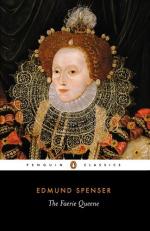XXIX
But this good knight soone as he them can spie,
For the cool shade[*] him thither hastly
got:
For golden Phoebus now ymounted hie,
255
From fiery wheeles of his faire chariot
Hurled his beame so scorching cruell hot,
That living creature mote it not abide;
And his new Lady it endured not.
There they alight, in hope themselves
to hide 260
From the fierce heat, and rest their weary limbs a
tide.
XXX
Faire seemely pleasaunce[*] each to other makes,
With goodly purposes[*] there as they
sit:
And in his falsed fancy he her takes
To be the fairest wight that lived yit;
265
Which to expresse he bends his gentle
wit,
And thinking of those braunches greene
to frame
A girlond for her dainty forehead fit,
He pluckt a bough;[*] out of whose rift
there came
Small drops of gory bloud, that trickled down the
same. 270
XXXI
Therewith a piteous yelling voyce was heard,
Crying, O spare with guilty hands[*] to
teare
My tender sides in this rough rynd embard,
But fly, ah fly far hence away, for feare
Least to you hap, that happened to me
heare, 275
And to this wretched Lady, my deare love,
O too deare love, love bought with death
too deare.
Astond he stood, and up his haire did
hove,
And with that suddein horror could no member move.
XXXII
At last whenas the dreadfull passion
280
Was overpast, and manhood well awake,
Yet musing at the straunge occasion,
And doubting much his sence, he thus bespake;
What voyce of damned Ghost from Limbo
lake,[*]
Or guilefull spright wandring in empty
aire, 285
Both which fraile men do oftentimes mistake,
Sends to my doubtfull eares these speaches
rare,
And ruefull plaints, me bidding guiltlesse bloud to
spare?
XXXIII
Then groning deepe, Nor damned Ghost, (quoth he,)
Nor guileful sprite to thee these wordes
doth speake, 290
But once a man Fradubio,[*] now a tree,
Wretched man, wretched tree; whose nature
weake
A cruell witch her cursed will to wreake,
Hath thus transformd, and plast in open
plaines,
Where Boreas doth blow full bitter bleake,
295
And scorching Sunne does dry my secret
vaines:
For though a tree I seeme, yet cold and heat me paines.
XXXIV
Say on Fradubio then, or man, or tree,
Quoth then the knight, by whose mischievous
arts
Art thou misshaped thus, as now I see?
300
He oft finds med’cine, who his griefe
imparts;
But double griefs afflict concealing harts,
As raging flames who striveth to suppresse.
The author then (said he) of all my smarts,
Is one Duessa a false sorceresse,
305
That many errant knights hath brought to wretchednesse.




